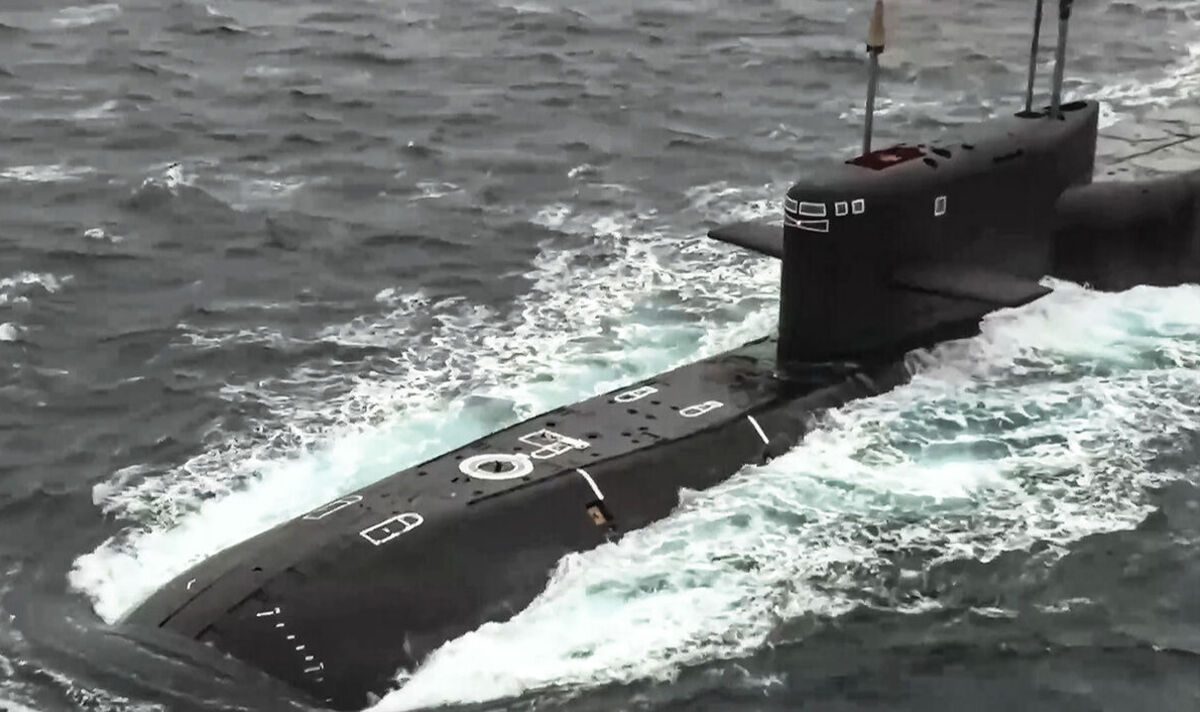Russian navy's Belogrod nuclear submarine sets sail in 2021
We use your sign-up to provide content in ways you’ve consented to and to improve our understanding of you. This may include adverts from us and 3rd parties based on our understanding. You can unsubscribe at any time. More info
Russia and the West are locked in a “potentially deadly game of hunter and hunted” which adds up to a “new Battle of the Atlantic”, an expert in naval warfare has warned. Iain Ballantyne, the editor of WARSHIPS International Fleet Review, was speaking in a month in which the Russian Navy commissioned its Project 636.3 submarine Ufa (P-588) with a ceremony in St Petersburg, underlining President Vladimir Putin’s maritime ambitions as his war on Ukraine ticked past the nine-month mark.
Almost simultaneously, Prime Minister Rishi Sunak earlier this month announced details of a £4.2billion contract for defence manufacturer BAE Systems to build five more Type 26 frigates, designed for anti-submarine warfare, for the Royal Navy.
Mr Ballantyne, writing exclusively for Express.co.uk, said: “There can be no doubt that in the past few years the potentially deadly game of hunter and the hunted is back on in the North Atlantic and the Arctic.
“It is by no means on the same scale of the old Cold War as the Russian Navy is so much smaller, as are the fleets of NATO.
“It is the nature of the new contest that makes it so dangerous to us all and radically different.”


It was no longer just a case of submarine versus submarine under the sea, or surface warships hunting submarines and vice versa although that still happened, Mr Ballantyne said.
Rather, tensions were characterised by the types of craft which Russia was investing in, including so-called “research ships”, he stressed.
He explained: “There are both submarines and ‘research vessels’ in Moscow’s order of battle that can act as mother ships for small undersea craft that can cut cables and pipelines.
“It potentially means Russia can cut us off from energy and also the Internet services that are so vital to so many aspects of our daily lives.”
JUST IN: Dramatic footage shows lava lighting as Mauna Loa erupts


Mr Ballantyne, whose new book, HMS London, was published earlier this month, added: “It’s worth noting that Russia’s submarines don’t just pose a threat to the seabed infrastructure, they can also also sink ships, launch missiles against cities from hundreds of miles away – something they have been doing in the Ukraine War and previously did during Russia’s Syrian intervention – and they also routinely try to find and trail the UK’s Trident nuclear deterrent submarines.
“Once a Trident vessel is detected and shadowed its ability to act as a nuclear deterrent is neutralised.”
American and British senior naval officers have been warning since at least the annexation of Crimea in 2014, that a “new Battle of the Atlantic is on”, Mr Ballantyne pointed out.
He continued: “Also, UK Prime Minister Rishi Sunak in 2017 wrote in a special report for the Policy Exchange think-tank, that Russian undersea forces pose a serious threat to undersea infrastructure of the UK, meaning internet cables in that case.
DON’T MISS
Russia gives Iran seized British weapons [INSIGHT]
Sean Penn hands over Oscar to Zelensky as Ukraine war rages on [ANALYSIS]
UK to send fighter jets and Chinooks to Russia’s doorstep [VIDEO]

The sabotage of the Nord Stream pipelines by persons unknown this year – likely to be Russian operatives – has clear demonstrated the threat to energy infrastructure too and that is why the Royal Navy, plus Norwegian, German and other NATO fleets have been on high alert in the North Sea and Baltic recently.”
In the speech at the annual Lord Mayor’s Banquet in London’s Guildhall last night, Mr Sunak outlined his vision of “robust pragmatism” in relation to both Russia and China
He said: “Russia is challenging the fundamental principles of the UN Charter. China is consciously competing for global influence using all the levers of state power.
“In the face of these challenges, short-termism or wishful thinking will not suffice. We can’t depend on Cold War arguments or approaches, or mere sentimentality about our past.”
Source: Read Full Article





